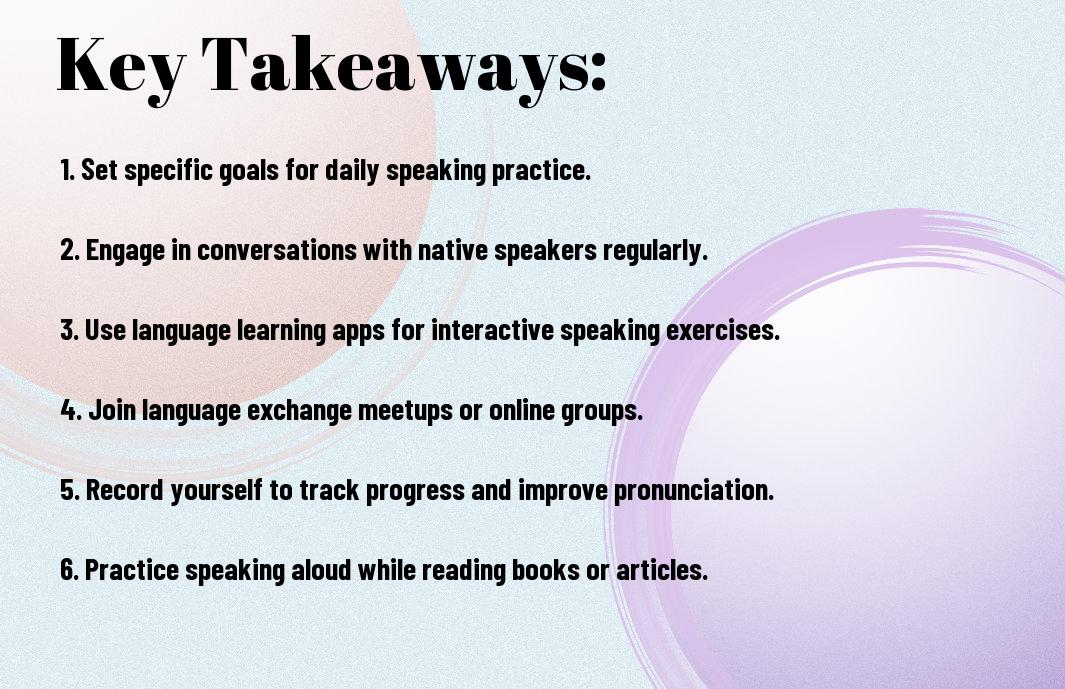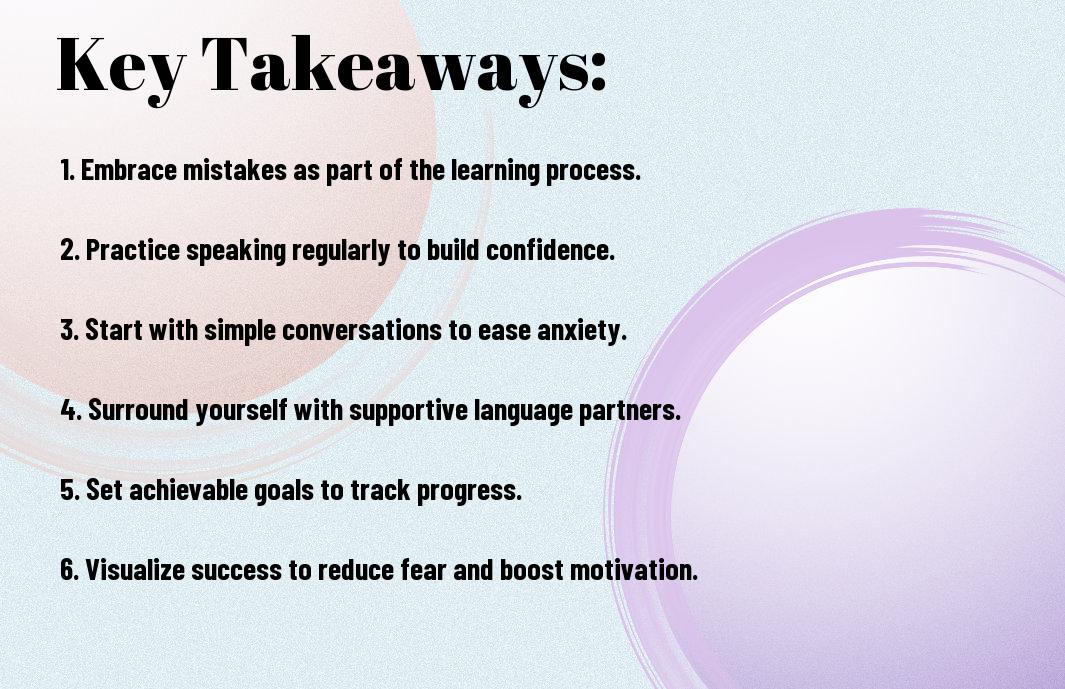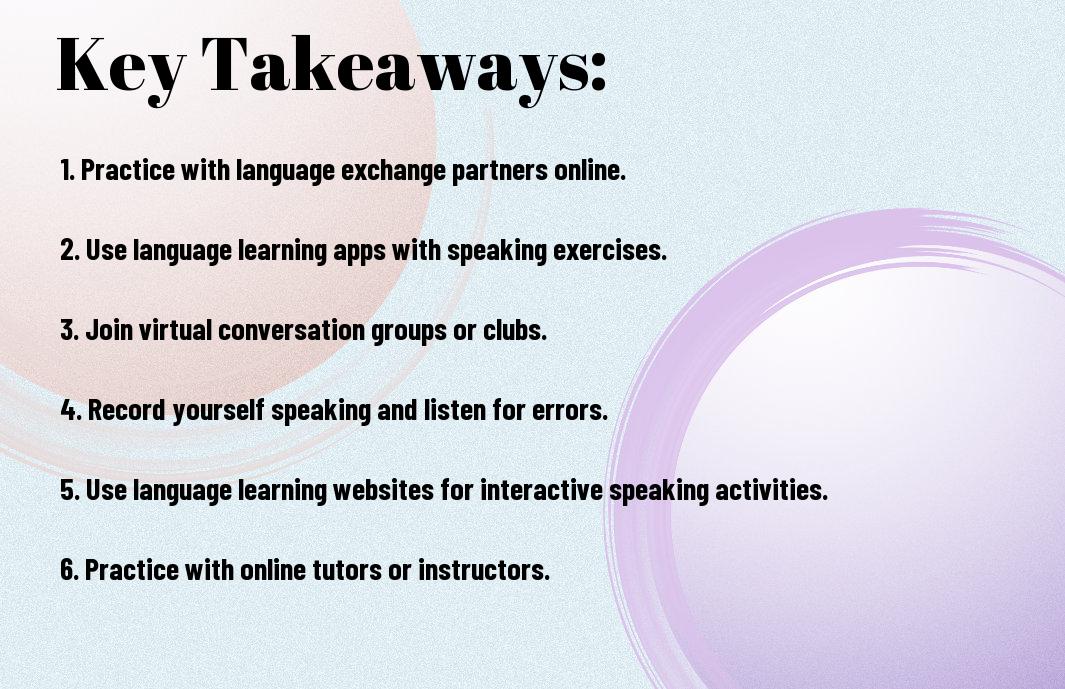You are about to initiate on a journey to improve your language skills, and your daily practice will be the key to success. Your ability to speak a new language confidently hinges on consistent effort. As you start this process, you will find that your pronunciation, vocabulary, and grammar will gradually improve. You will learn how to make speaking a new language a part of your daily routine, helping you to stay motivated and achieve your goals.

Key Takeaways:
To improve your speaking skills in a new language, follow these daily practice tips:
- Set aside a dedicated time each day to practice speaking, even if it’s just for a few minutes, to build consistency and make it a habit.
- Use language learning apps or online resources to access a variety of speaking exercises, such as audio recordings, videos, and interactive conversations, to improve your pronunciation and intonation.
- Practice speaking with a language exchange partner or tutor to get feedback on your speaking skills and to learn from a native speaker, which can help you improve your fluency and confidence.
- Listen to native speakers and try to mimic their speech patterns, including their tone, pitch, and rhythm, to improve your accent and comprehension.
- Record yourself speaking and listen to the recordings to identify areas that need improvement, such as grammar, vocabulary, and pronunciation, and to track your progress over time.
Setting Goals
A key aspect of improving your language skills is to establish a clear plan, which begins with setting achievable goals. You need to determine what you want to accomplish and how you intend to get there. This will help you stay focused and motivated throughout your language learning journey.
Defining Language Learning Objectives
To tailor your approach, you should define your language learning objectives, considering what aspects of the language you want to improve, such as speaking, writing, or listening. You will then be able to design a strategy that meets your specific needs.
Creating a Daily Practice Schedule
Beside mapping out your long-term goals, you must create a daily practice schedule to ensure consistent progress. You should allocate a specific time each day to practice speaking, even if it’s just for a few minutes.
Goals for your daily practice schedule should be specific, measurable, and attainable. You will find that dedicating a few minutes each day to speaking practice, whether through speaking with a language exchange partner, using a language learning app, or watching TV shows in the target language, will significantly enhance your speaking skills over time. As you follow your schedule, you will become more confident in your ability to express yourself in the new language.

Immersion Techniques
If you want to improve your speaking skills, surrounding yourself with the language is imperative. You can do this by incorporating immersion techniques into your daily routine, such as listening to native speakers and watching foreign language media.
Listening to Native Speakers
Natively spoken language can be found in various forms of media, and you can use it to your advantage by listening to podcasts, radio shows, or audiobooks in your target language.
Watching Foreign Language Media
Between TV shows and movies, there are plenty of options to choose from, and you can start with subtitles in your native language to help you understand the dialogue, then gradually switch to subtitles in the target language.
Watching foreign language media can be an entertaining way to improve your listening and comprehension skills, and you can even pause and replay scenes to catch any phrases or words you didn’t understand, allowing you to learn at your own pace and repeat phrases to practice your pronunciation.
Speaking Exercises
For effective language practice, you should engage in speaking exercises daily. This can be done by speaking with native speakers, recording yourself, or using online resources. Your goal is to improve your pronunciation, intonation, and fluency in the target language.
Finding a Language Partner
Almost anyone can find a language partner through local language exchange events or online communities. You can practice speaking with your partner for a set amount of time each day, discussing various topics and correcting each other’s mistakes. Your language partner can provide you with valuable feedback on your pronunciation and grammar.
Using Online Language Learning Platforms
Almost anything you need to learn a language can be found on online platforms. You can use these platforms to access language lessons, practice speaking with native speakers, and track your progress. Your online language learning experience can be tailored to your needs and goals.
Plus, many online language learning platforms offer interactive speaking exercises, such as voice recordings and conversations with chatbots or real people. You can use these resources to practice your speaking skills at any time, from anywhere, and receive instant feedback on your performance. This will help you to identify areas for improvement and work on developing your speaking skills more effectively.
Vocabulary Building
Unlike other aspects of language learning, vocabulary building requires consistent practice to see significant improvement. You will need to make a conscious effort to learn new words daily and use them in context to reinforce your understanding.
Learning New Words Daily
To take your language skills to the next level, you should strive to learn a set number of new words each day, using them in sentences to help solidify their meaning and usage in your mind.
Using Flashcards and Language Learning Apps
For effective vocabulary building, you can utilize flashcards and language learning apps, which provide an efficient way to learn and revise new words, phrases, and their meanings, allowing you to track your progress and identify areas for improvement.
Learning a new language with the help of flashcards and apps can be an engaging experience, as you can access a vast library of words, phrases, and expressions, and practice them at your own pace, helping you develop a robust vocabulary and enhance your communication skills in the target language, enabling you to express yourself more confidently and accurately, and you will find that your vocabulary expands rapidly as you continue to practice and learn new words daily.
Pronunciation Practice
Keep practicing your pronunciation by listening to native speakers and mimicking their intonation and rhythm. You can find numerous resources online, including audio clips and videos, to help you improve your pronunciation skills.
Recording Yourself
One effective way to track your progress is by recording yourself speaking the new language. You can use your smartphone or computer to record your voice and identify areas that need improvement, allowing you to adjust your pronunciation accordingly.
Receiving Feedback from Others
Feedback from others is vital to enhancing your pronunciation. You can join language exchange programs or practice with a language partner who can provide you with constructive feedback on your pronunciation.
In fact, receiving feedback from others can help you pinpoint specific sounds or intonations that you struggle with, enabling you to focus your practice on those areas and make significant improvements in your pronunciation over time, as you continue to work on your language skills, you will find that your ability to communicate effectively in the new language will greatly improve.
Overcoming Challenges
After encountering obstacles, you will find that learning a language requires perseverance. You can find helpful tips on learning a new language efficiently to aid in your progress.
Dealing with Self-Doubt and Fear
Against the feeling of uncertainty, you must push forward and focus on your goals, allowing yourself to make mistakes and learn from them.
Staying Motivated and Consistent
Across the journey of language learning, you will face various challenges, but maintaining a consistent practice routine will help you stay on track.
Due to the complexity of language learning, it is necessary to break down your goals into smaller, achievable tasks, and celebrate your progress along the way, which will help you stay motivated and committed to your daily practice, ultimately leading to significant improvement in your speaking skills over time, as you continue to challenge yourself and push beyond your comfort zone, adapting to new situations and conversations with increased confidence and fluency.
Final Words
Now that you have learned various methods to practice speaking a new language daily, you can start implementing them in your routine. You will see improvement in your speaking skills if you consistently practice using your target language in daily conversations, whether with native speakers or language exchange partners. Your dedication and persistence will ultimately lead to confidence in speaking your new language.
FAQ
Q: What are some effective ways to practice speaking a new language daily?
A: Practicing speaking a new language daily can be achieved through various methods. One way is to engage in conversations with native speakers, either in person or online, for at least 15-20 minutes. Another method is to use language learning apps that offer speaking exercises and interactive lessons. Additionally, watching TV shows or movies in the target language with subtitles, speaking with yourself in the mirror, or recording yourself and listening to the recordings can also help improve your speaking skills.
Q: How can I overcome my fear of speaking a new language and improve my pronunciation?
A: To overcome the fear of speaking a new language, start by practicing in low-stakes situations, such as speaking with a language exchange partner or recording yourself. Focus on listening to native speakers and try to mimic their pronunciation, intonation, and rhythm. You can also listen to podcasts, radio shows, or audiobooks in the target language to get accustomed to its sound and structure. Furthermore, try to speak as much as possible, even if it’s just for a few minutes a day, and don’t be afraid to make mistakes – it’s a natural part of the learning process.
Q: What are some tips for creating a daily routine to practice speaking a new language consistently?
A: To create a daily routine, set a specific time and goal for speaking practice, such as 30 minutes in the morning or 15 minutes during your lunch break. Use a planner, calendar, or app to schedule your practice sessions and track your progress. You can also find a language learning buddy or accountability partner to motivate you and provide feedback. Consistency is key, so try to practice at the same time every day, even if it’s just for a short period. Additionally, mix up your practice activities, such as switching between speaking, listening, and reading, to keep your routine engaging and prevent boredom.





